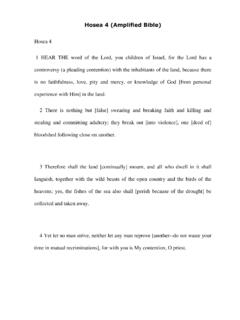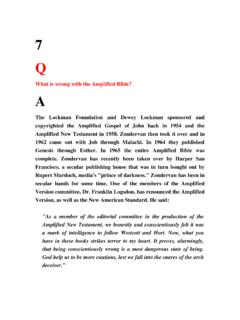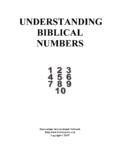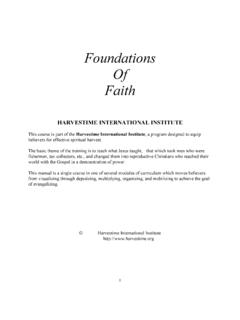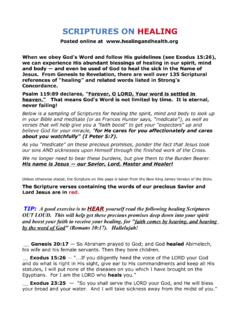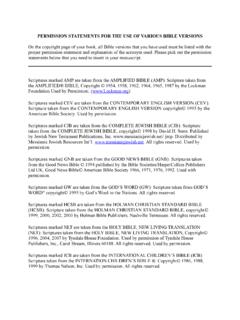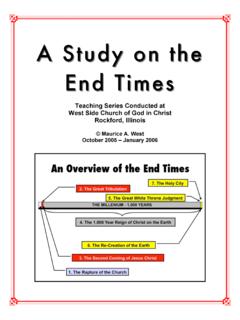Transcription of Amplified® Bible All rights reserved. www.lockman
1 amplified Bible Copyright 2015 by The Lockman Foundation, La Habra, CA 90631 All rights reserved . The " amplified " trademark is registered in the United States Patent and Trademark Office by The Lockman Foundation. Use of this trademark requires the permission of The Lockman Foundation. For Permission to quote information visit, About the amplified Bible of 2015 The amplified Bible is a Literal Equivalent translation that, by using synonyms and definitions, both explains and expands the meaning of words in the text by placing amplification in parentheses, brackets, and after key words. This unique system of translation allows the reader to more completely and clearly grasp the meaning as it was understood in the original languages.
2 Additionally, amplifications may provide further theological, historical, and other details for a better understanding of the text. The appeal and readability of the 2015 edition of the amplified Bible has been broadened by refreshing the English and refining amplifications for relevance and clarity. The result is an amplified Bible that is easier to read and better than ever to study and understand. The amplified Bible now includes more amplification in the Old Testament and refined amplification in the New Testament. Additionally, the Bible text has been improved to read smoothly with or without amplifications, so the text may be read clearly either way.
3 The same feel and style of amplification has been carefully maintained, so those who read the classic amplified Bible will easily transition to the new text and appreciate its improvements. The amplified Bible is a Literal Equivalent translation of the Bible that enhances the clarity of Scripture by using in-text amplifications. The amplifications are based on the nuances of the Greek and Hebrew languages as well as the latest advances in biblical research. These amplifications uniquely expand and clarify the biblical text immediately giving the reader a deeper understanding of Scripture. The amplified Bible presents God's Word in an exciting way because it actually provides two translations of the Bible .
4 This method of translation opens a unique door for readers and invites them to step into a broader understanding of Scripture as the amplifications challenge readers to dig deeper into the meaning of biblical passages by breaking through the language barrier of the Greek and Hebrew languages. The amplified Bible consists of two parts: 1) The Foundational Translation is the literal equivalent of the original Greek and Hebrew text and may be read by skipping over the amplifications. 2) The amplified Translation is the foundational text that includes amplifications to enhance readability, textual understanding, and to provide a framework for deeper study and spiritual growth by providing fresh insight by enhancing clarity.
5 Benefits of amplification based on the shades of meaning found in the original languages: 1) Amplifications are used to reveal a word's intensity or power along with the nuances of the Hebrew, Aramaic, and Greek word used in the original text: "So repent [change your inner self--your old way of thinking, regret past sins] and return [to God--seek His purpose for your life], so that your sins may be wiped away [blotted out, completely erased], so that times of refreshing may come from the presence of the Lord [restoring you like a cool wind on a hot day]." Acts 3:19 2) Amplifications are used to clarify the meaning of a theological word: "Who will bring any charge against God's elect (His chosen ones)?
6 It is God who justifies us [declaring us blameless and putting us in a right relationship with Himself]." Romans 8:33 3) Amplifications give greater depth to key verses: "And we know [with great confidence] that God [who is deeply concerned about us] causes all things to work together [as a plan] for good for those who love God, to those who are called according to His plan and purpose." Romans 8:28 Amplifications of the same word or phrase may differ slightly in wording depending on context or emphasis, or to indicate another theological or language nuance, or to encourage self-study. Also many words have slightly different meanings in different verses, so amplifications vary accordingly.
7 4) Use of brackets in amplification in the amplified : Brackets may be used to add information supported by other Scripture, which helps explain verses that are sometimes misquoted or misunderstood: "Therefore you have no excuse or justification, everyone of you who [hypocritically] judges and condemns others; for in passing judgment on another person, you condemn yourself, because you who judge [from a position of arrogance or self-righteousness] are habitually practicing the very same things [which you denounce]." Romans 2:1 5) In some verses brackets are used to clarify a theological word not commonly used in everyday language: "Therefore, since we have been justified [that is, acquitted of sin, declared blameless before God] by faith, [let us grasp the fact that] we have peace with God [and the joy of reconciliation with Him] through our Lord Jesus Christ (the Messiah, the Anointed).
8 " Romans 5:1 6) Brackets may be used within a verse to add information that would otherwise be placed in a footnote: "At that time Herod [Antipas], the tetrarch [who governed a portion of Palestine, including Galilee and Perea], having heard reports about Jesus," Matthew 14:1 Note: Brackets in bold type [..] indicate manuscript differences and are footnoted. 7) Use of italics in the amplified : Words implied, but not actually contained in the original text are printed in italic type: Then came the preparation day of Unleavened Bread on which the Passover lamb had to be sacrificed." Luke 22:7 8) The use of italic "and" "or" "nor" introduces amplification within a sentence: "But if you are guided and led by the Spirit, you are not subject to the Law.
9 " Galatians 5:18 9) Use of parentheses in the amplified : Parentheses in Roman type (..) supply the definition of a word in context. When reading an amplified verse the definition in context may be skipped over: "Now Hagar is (represents) Mount Sinai in Arabia and she corresponds to the present Jerusalem, for she is in slavery with her children." Galatians 4:25. Parentheses in bold type (..) indicate a parenthetical phrase in the text and should be included when reading aloud: 10) Use of nouns and pronouns in the amplified : Names of persons and/or places are often used to replace pronouns to help the reader's understanding of a verse without having to return to the beginning of the passage for clarity.
10 11) In some verses pronouns retained in the text may be followed by a proper name placed in parenthesis: "..he (John) saw the Spirit of on Him (Jesus)." Matt 3:16 12) Pronouns referring to God, the Father; Jesus, the Son; and the Holy Spirit are always capitalized, so that the reader immediately recognizes deity in the text. 13) General format (paragraphs/verse numbers) in the amplified : Quotation marks have been added according to normal English usage. Paragraph markers have been added. Old Testament quotations in the New Testament are set in distinctive type. The Letter of Paul to theRomansThe Gospel Exalted1 Paul, aabond-servant of Christ Jesus, called as anapostle (special messenger, personally chosenrepresentative)

